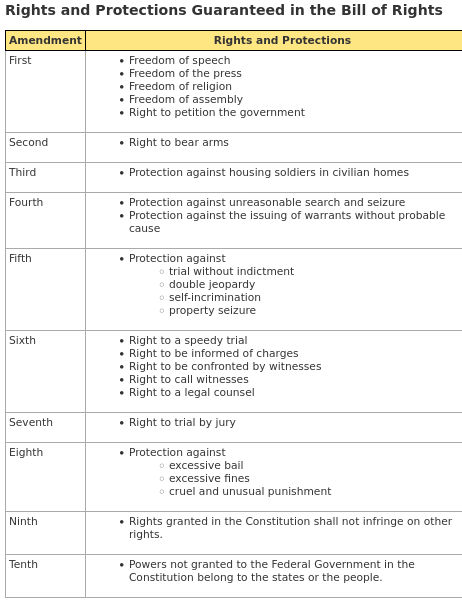When we strive to accumulate the skills, the knowledge, the tools for taking care of ourselves to the full extent possible and in cooperation, harmony with those around us, we rely on the ability to do this without punishment. That ability is underwritten, at least in this particular country, by the Bill of Rights. Or is it, still?
Recent protests have triggered references to the Bill of Rights, particularly the 1st, 4th and 5th Amendments. We so readily assume these rights in our daily lives that we can become a little rusty on exactly what they are. USHistory.org provides a good synopsis:

These rights, so taken for granted by most of us, are often termed "natural rights" because they are so basic:
While it was third on the list of original proposals in the Bill of Rights that Congress submitted to the states for approval, the First Amendment was the first amendment to deal with natural individual rights. Almost without exception, the rights in the First Amendment are thought to be natural rights because they deal with matters of conscience, thought, and expression. ~ ThoughtCo.
So much a part of being human, they seem unquestionable, unassailable. They're not.
In the United States, the Civil Rights Movement of the 1960s and women's movement of the 70s fought to apply to all Americans - regardless of the color of skin or sex they were born with - those "natural", also termed "civil" rights enumerated in the First Amendment. Arguably, progress was made. But, however much these rights mean to the "life, liberty, and pursuit of happiness" of the people, they irritatingly interfere with the wealthy and powerful in their accumulation of still more wealth and power. Remember, they're in the First Amendment. They didn't make it into the Constitution proper.
Tools to reverse civil rights progress began rolling out in waves in the fall of 2001 with the Uniting and Strengthening America by Providing Appropriate Tools Required to Intercept and Obstruct Terrorism Act. Introduced into the House of Representatives October 23th, the 300-400-page document of undisclosed actual length known as the PATRIOT Act was passed by the House October 24th, by the Senate October 25th, and signed into law by President Bush October 26th. (Having been thoroughly read and discussed by all members of Congress, of course.) On September 22, 2006, Mitch McConnell introduced to the Senate the Military Commissions Act of 2006, which authorizes trial by a military commission for all "violations of the law of war, and for other purposes". The Senate passed it September 28; the House passed it September 29; and the president signed it October 17th.
According to the ACLU, this act, "Eliminates due process. This law removes the Constitutional due process right of habeas corpus for persons the president designates as unlawful enemy combatants." Habeus corpus: "Latin for 'that you have the body.' In the US system, federal courts can use the writ of habeas corpus to determine if a state's detention of a prisoner is valid." ~ Cornell Law School This is commonly known as "due process". Again, Cornell Law School: "The Constitution states only one command twice. The Fifth Amendment says to the federal government that no one shall be 'deprived of life, liberty or property without due process of law.' The Fourteenth Amendment, ratified in 1868, uses the same eleven words, called the Due Process Clause, to describe a legal obligation of all states. These words have as their central promise an assurance that all levels of American government must operate within the law ('legality') and provide fair procedures."
On his October 20 "Countdown", Keith Olberman examined the Military Commissions Act and its relationship to the Bill of Rights (at 05:30).
Following these legal erosions of civil rights, an Orwellian movement to culturally reverse civil rights gains began in the 2010s when the post-modernist "Woke" movement and "identity politics" further stifled free speech and turned the human rights movement on its head by questioning the "human" part. Today, we witness the results of both assaults, legal and cultural, on campuses throughout the Western world where corporate-influenced administrations no longer support natural rights. Former CIA analyst Ray McGovern adroitly explains:
Steps toward self-reliance are steps toward the rights enumerated in our Bill of Rights. As continually quoted in this column, "The only winning move is not to play" and "Resistance is fertile." It's still not too late to plant - even in a container - some potatoes. Or squash.
Ray McGovern came to Washington from his native Bronx in the early Sixties as an Army infantry/intelligence officer and then served as a CIA analyst for 27 years, from the administration of John F. Kennedy to that of George H. W. Bush. Ray’s duties included chairing National Intelligence Estimates and preparing the President’s Daily Brief, which he briefed one-on-one to President Ronald Reagan’s five most senior national security advisers from 1981 to 1985. https://raymcgovern.com




